Discovering the sugar content of fruit and the factors that influence it is important when making informed decisions about your diet. Popular fruits like mangoes, grapes, cherries, and bananas are high in sugar content but still have a lot of amazing health benefits. Learn how to make informed choices and enjoy these delicious fruits in moderation for a balanced diet.
The Importance of Understanding Sugar Content in Fruits
Understanding the sugar content in fruits is important for individuals who want to maintain a healthy and balanced diet. By being aware of the sugar levels in different fruits, you can make informed choices about your consumption and better manage your overall intake of calories and sugar. Eating high-sugar fruits can cause blood sugar issues and make also cause Gastrointestinal ("GI") distress for people who are sensitive to fructose.
When it comes to sugar, not all fruits are created equal. While fruits are vital to a well-rounded diet, some contain higher sugar levels than others. Even though some fruits are high in sugar, it does not mean they are lacking in nutrition. Knowing these differences allows you to make conscious decisions based on your specific dietary needs, such as managing blood sugar levels or reducing overall sugar intake.
If you are going to consume fruit it is ideal to eat whole fruit rather than consume things like fruit juice as these products can cause a blood sugar spike. Dried fruit is also a good option in small quantities.
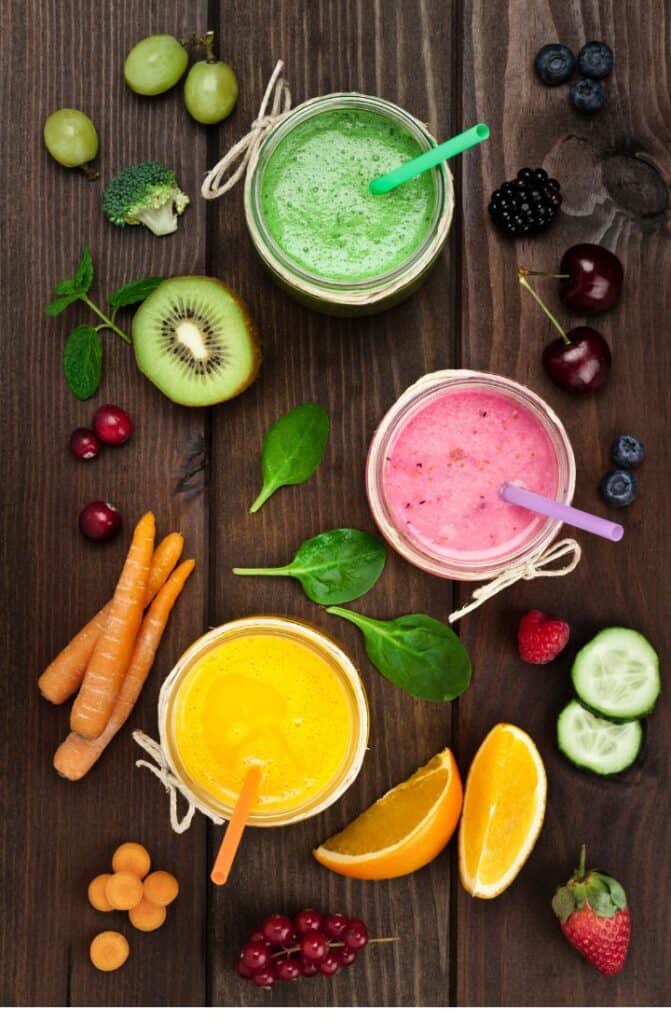
Factors Influencing Sugar Content in Fruits
Several factors influence the sugar content in fruits, and understanding these factors can provide valuable insights into the variations observed in different fruits.
Natural Variation
One crucial factor that contributes to the sugar content of fruit is the natural variation within fruit species. Different varieties can exhibit varying sugar levels even within the same type of fruit, such as apples or grapes. This variation occurs due to genetic differences and can result in a wide range of sweetness levels.
Ripeness
Ripeness level also plays a significant role in fruit sugar content. As fruits mature and ripen, their sugar levels tend to increase. For example, a ripe banana will be sweeter than an unripe one. Timing your fruit consumption based on ripeness can help you to control your sugar intake.
Environment & Cultivation
Environmental conditions, including climate and soil composition, can impact the sugar content in fruits. Fruits grown in warmer regions with abundant sunlight tend to develop higher sugar levels. Things like cultivation techniques, such as irrigation and fertilization, can also influence sugar content. For instance, grapes grown in certain vineyards known for producing sweeter wines are often subjected to specific cultivation practices to enhance their sugar levels.
While understanding the factors influencing sugar content in fruits is valuable, it shouldn't overshadow the numerous health benefits that fruits provide. Fruits are rich in essential vitamins, minerals, antioxidants, and fiber, all crucial for overall well-being. Incorporating a variety of fruits into our diet ensures we obtain a diverse array of nutrients.
Fruits with High Sugar Content
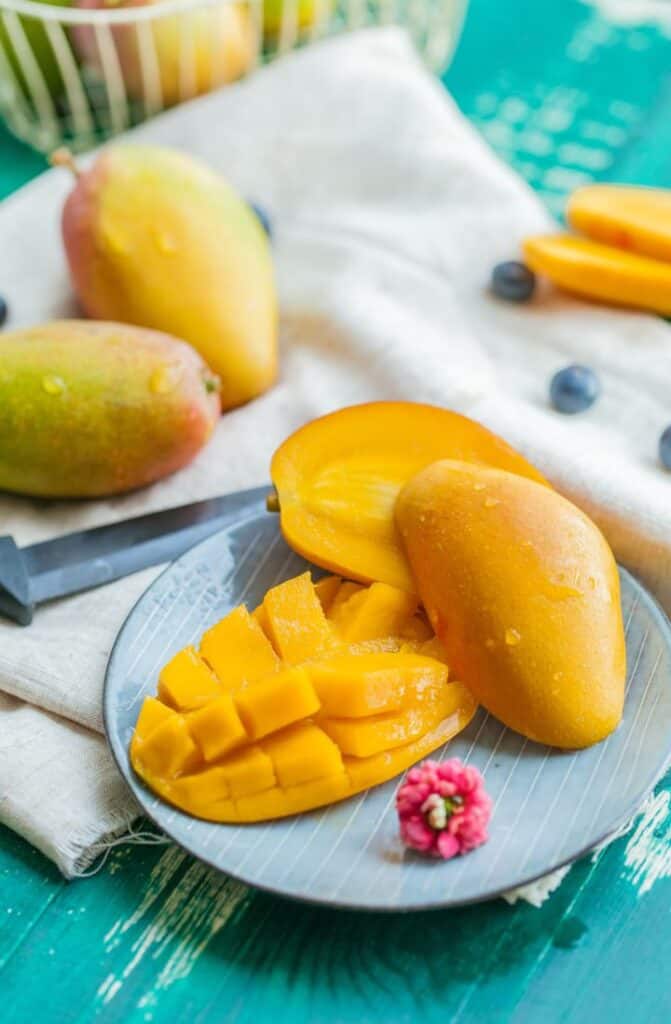
Mangoes
Mangoes are delicious and are a tropical fruit known for their sweet flavor and are often used in smoothies or cut into slices and eaten as a snack. They contain approximately 14-16 grams of natural sugar per 100 grams of fruit. Factors like ripeness and variety influence the sugar content of mangoes. When mangoes are fully ripe they tend to have higher sugar levels but also be the most delicious. They offer many health benefits as they are nutrient-rich, a good source of fiber, and packed with antioxidants.
Mangoes provide essential vitamins and minerals, support digestion and eye health, and have antioxidant properties. It's important to enjoy mangoes in moderation, considering portion sizes and overall sugar intake, especially for those with specific dietary requirements or conditions like diabetes. It is recommended to incorporate mangoes into a balanced diet and pair them with other nutritious foods like granola and yogurt. Mangoes can be enjoyed as a snack, added to smoothies, salads, or salsas, providing a delicious tropical twist to meals.
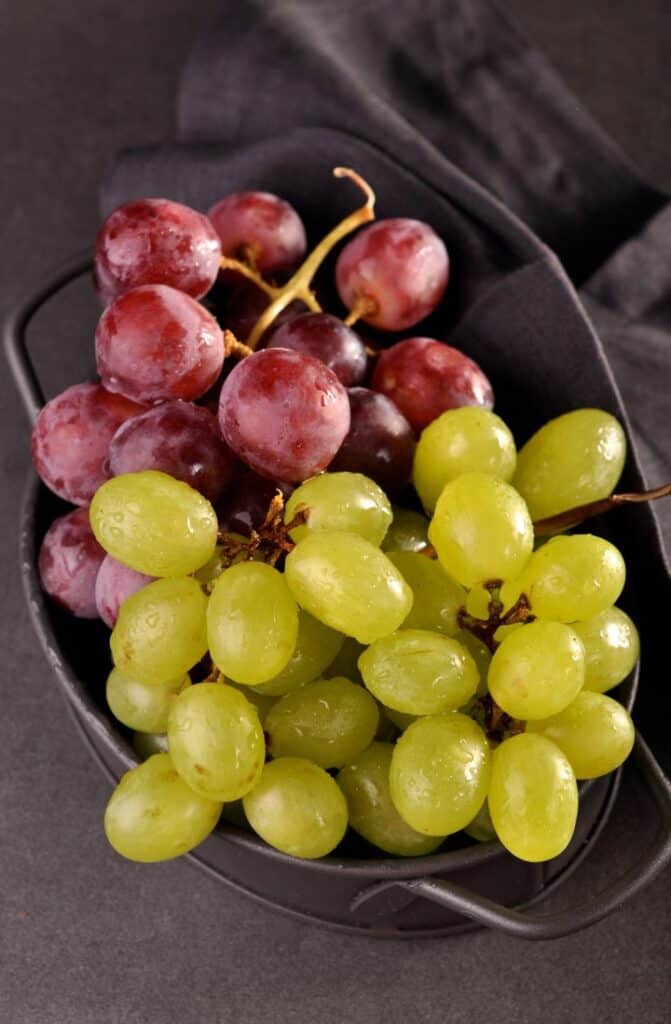
Grapes
Grapes are a versatile and delicious fruit known for their natural sweetness. They are often eaten alone or tossed into salads for a sweet and crisp bite. They contain around 16-20 grams of sugar per 100 grams of fruit. The sugar content of grapes can vary based on the variety, ripeness, and environmental conditions. Grapes offer numerous health benefits, including being rich in antioxidants, essential vitamins, and minerals. This is one of the reasons people encourage wine in moderation.
They can help promote heart health, support immune function, aid digestion, and contribute to hydration. However, consuming grapes moderately is important due to their sugar content. If you have issues with your blood sugar or are trying to lose weight, you should be cautious about how many grapes you consume. Pairing grapes with other healthy foods such as tossing them into a salad as a sweetener is recommended as a way to balance them out. Individuals with digestive issues or allergies should be mindful of their consumption because they may cause stomach discomfort. Grapes can be a nutritious addition to a well-balanced diet.
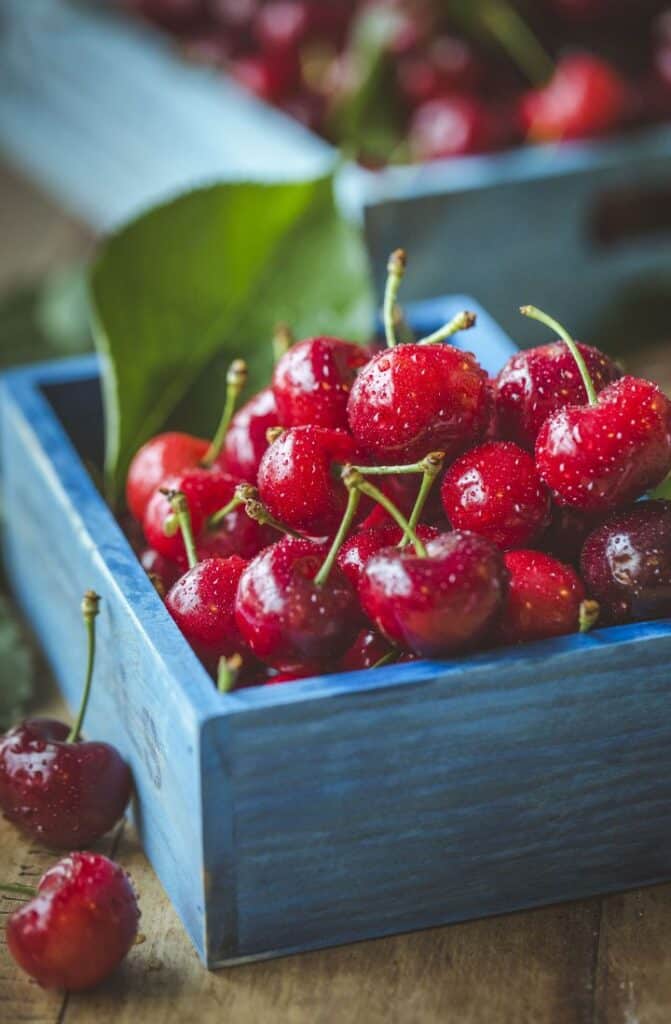
Cherries
Cherries are a sweet and vibrant fruit often used in smoothies, as a cake or ice cream topping, or eaten as a standalone snack. They contain around 12-18 grams of natural sugar per 100 grams and offer several health benefits. These health benefits include antioxidants, anti-inflammatory properties, essential nutrients, and potential sleep support. Drinking Tart cherry juice is often recommended as a recovery protocol for endurance athletes or a natural sleep aid for people with trouble falling asleep. Another bonus is that cherries, including both sweet cherries and tart cherries, are a good source of vitamin C.
Remember that moderation is important due to the sugar content of cherries, especially for those with specific dietary needs. Cherries can easily be enjoyed as part of a balanced diet, and when paired with other nutrient-dense foods and things like proteins and carbs, they are the perfect addition to any meal or snack. Eating too many cherries can cause gastrointestinal issues, so be cautious with your portions and do not overdo it unless you want to end up with a stomach ache.

Bananas
Often a popular snack for athletes, bananas are a versatile and beloved fruit known for their natural sweetness and creamy texture. They contain around 17-20 grams of natural sugar per 100 grams of fruit. The more ripe the banana is, the more sugar it contains. Many people prefer very ripe bananas because of this. They tend to be sweeter and creamier. Bananas are full of health benefits, including essential nutrients, energy boosts, digestive health support, and potential nutrient absorption improvement.
Bananas are a good source of several important electrolytes like potassium, magnesium, and small amounts of sodium and calcium. They are also loaded with sugars and, therefore, carbohydrates, so if you have any dietary needs that require you to limit either of those things, then you will want to moderate your banana intake. Some individuals may even experience digestive discomfort with unripe or excessive banana consumption. Pairing bananas with healthy fats and proteins such as peanut butter is a great way to incorporate them into your diet.
Takeaways
Knowing more about the sugar content in fruits empowers you to make informed decisions about your dietary choices. You can manage your sugar intake effectively by considering natural variation, ripeness, and environmental conditions.
Remember, while sugar content is a factor to consider, the overall nutritional value of fruits should guide our choices. Striving for balance and variety ensures we enjoy the benefits of fruits while maintaining a healthy lifestyle.

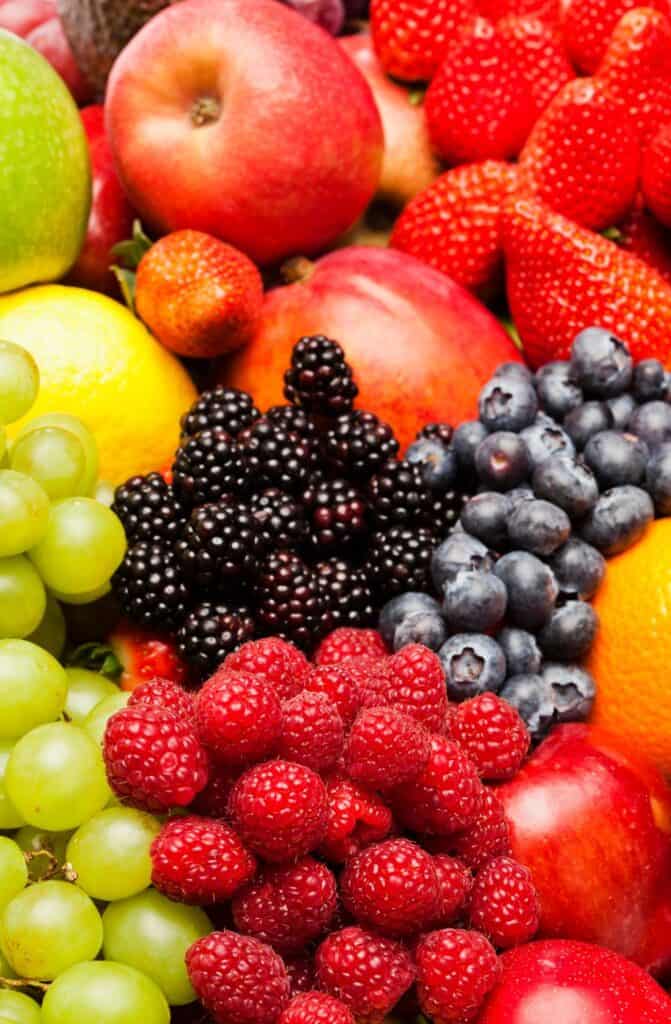

Comments
No Comments